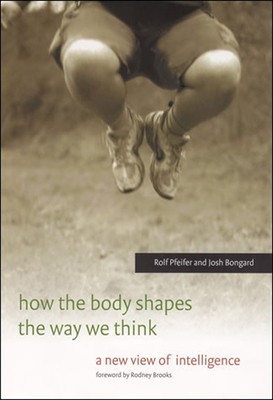
- We will send in 10–14 business days.
- Author: Rolf Pfeifer
- Publisher: MIT Press
- ISBN-10: 0262537427
- ISBN-13: 9780262537421
- Format: 15.2 x 22.9 x 2.2 cm, minkšti viršeliai
- Language: English
- SAVE -10% with code: EXTRA
Reviews
Description
An exploration of embodied intelligence and its implications points toward a theory of intelligence in general; with case studies of intelligent systems in ubiquitous computing, business and management, human memory, and robotics.How could the body influence our thinking when it seems obvious that the brain controls the body? In How the Body Shapes the Way We Think, Rolf Pfeifer and Josh Bongard demonstrate that thought is not independent of the body but is tightly constrained, and at the same time enabled, by it. They argue that the kinds of thoughts we are capable of have their foundation in our embodiment--in our morphology and the material properties of our bodies.
This crucial notion of embodiment underlies fundamental changes in the field of artificial intelligence over the past two decades, and Pfeifer and Bongard use the basic methodology of artificial intelligence--"understanding by building"--to describe their insights. If we understand how to design and build intelligent systems, they reason, we will better understand intelligence in general. In accessible, nontechnical language, and using many examples, they introduce the basic concepts by building on recent developments in robotics, biology, neuroscience, and psychology to outline a possible theory of intelligence. They illustrate applications of such a theory in ubiquitous computing, business and management, and the psychology of human memory. Embodied intelligence, as described by Pfeifer and Bongard, has important implications for our understanding of both natural and artificial intelligence.
EXTRA 10 % discount with code: EXTRA
The promotion ends in 22d.23:35:22
The discount code is valid when purchasing from 10 €. Discounts do not stack.
- Author: Rolf Pfeifer
- Publisher: MIT Press
- ISBN-10: 0262537427
- ISBN-13: 9780262537421
- Format: 15.2 x 22.9 x 2.2 cm, minkšti viršeliai
- Language: English English
How could the body influence our thinking when it seems obvious that the brain controls the body? In How the Body Shapes the Way We Think, Rolf Pfeifer and Josh Bongard demonstrate that thought is not independent of the body but is tightly constrained, and at the same time enabled, by it. They argue that the kinds of thoughts we are capable of have their foundation in our embodiment--in our morphology and the material properties of our bodies.
This crucial notion of embodiment underlies fundamental changes in the field of artificial intelligence over the past two decades, and Pfeifer and Bongard use the basic methodology of artificial intelligence--"understanding by building"--to describe their insights. If we understand how to design and build intelligent systems, they reason, we will better understand intelligence in general. In accessible, nontechnical language, and using many examples, they introduce the basic concepts by building on recent developments in robotics, biology, neuroscience, and psychology to outline a possible theory of intelligence. They illustrate applications of such a theory in ubiquitous computing, business and management, and the psychology of human memory. Embodied intelligence, as described by Pfeifer and Bongard, has important implications for our understanding of both natural and artificial intelligence.


Reviews